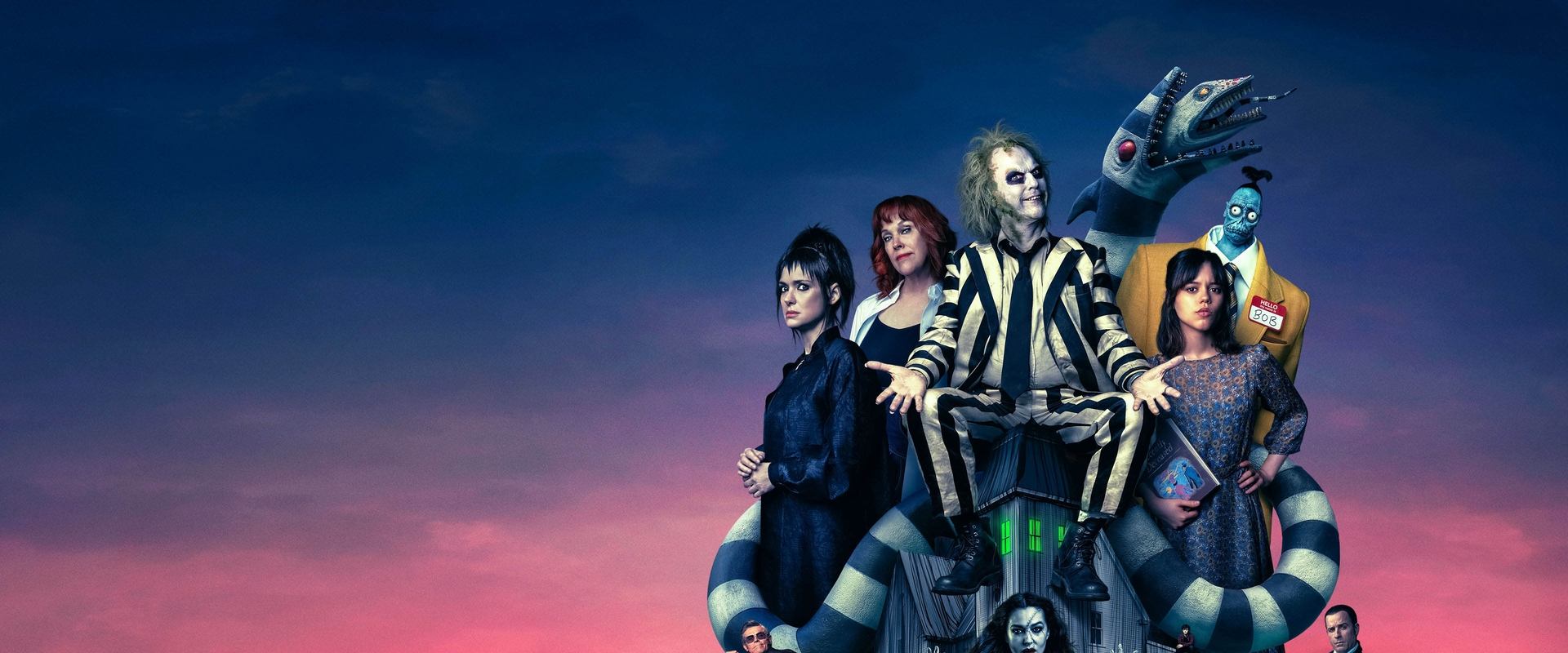Let’s not pretend that Beetlejuice Beetlejuice—yes, the title practically goads you into saying it twice—enters a landscape desperate for more reanimated ’80s phantoms. We have sequels popping up like dandelions in the same graveyard Tim Burton loves to till, but this one… well, I found myself in that rare happy limbo of not quite a fan, not quite a skeptic, and certainly, this time, not alone. If there’s a test for the strength of a movie’s oddball charm, it’s subjecting it to the formidable gaze of a six-year-old—my daughter, that is—and Beetlejuice Beetlejuice had both of us swaying between giggles and gasps, half bewitched and mostly amused.
Thirty-six years marinating in nostalgia juice, and Burton finally uncorks the bottle. Is it intoxicating? Well, maybe not an orgiastic rush the way Altman tossed Nashville to the heavens, but the high is unmistakable—ragged, patchy, but real. You can feel the handprints of studio resurrection on the set, but also Burton’s glittery fingerprints: the goofy gloom, the riot of tactile set pieces, and that sweet, slightly moldy spirit wafting up from the original. There’s nothing sleek or antiseptic here; this is blockbuster as mausoleum art installation.
Let’s get something off the tombstone: I never loved the first Beetlejuice—the movie always struck me as a teenager’s fever dream of rebellion, more an anthology of outlandish gestures than a fully realized story. But here’s Burton, older if not wiser, giving that same fever new vectors: Lydia Deetz (Winona Ryder, who slips back into black like she never shed it) has become a mourning talk-show ghoul-mother, haunted not by ghosts so much as grief, regret, and the kind of mother-daughter antagonism that feels all too sorely alive. Her daughter, Astrid—Jenna Ortega, fusing the brittle edge of mod goth with disarming warmth—pushes at Lydia’s seams, and suddenly “family” is the only afterlife anyone really fears.
It’s comforting, or maybe just sly, how Michael Keaton’s Betelgeuse—the original lecherous agent of anarchy—returns with every tick, twitch, and lewd cackle intact. He’s a chaos agent in worse taste than ever, a demon who seems to have crash-landed from a forbidden Saturday morning cartoon. Keaton, unfettered by continuity or political correctness, has fun—infectiously so, and in a way that turns even the most inane one-liner or egregious eye-bulge into a gift for the loyalists. Watching with my daughter, I could almost forgive the plot’s Twitter-feed distractions and script hiccups. She belly-laughed at every pratfall; I grinned because the old grotesquerie felt new again through her eyes.
The real surprise is that the female relationships come to matter more than the whirlwind plot. Ortega’s Astrid and Ryder’s Lydia suffer and spar their way toward a finale embroidered with mother-daughter rapprochement, supernatural shenanigans, and wedding interruptions so raucous I half-expected a sandworm to swallow the audience whole. Catherine O’Hara, returning as Delia—ethereal, ditsy, and now a SoHo gallery queen—brings her own daffy magic: she gives the movie a buoyancy whenever things threaten to get bogged down in bureaucratic afterlife politics (the Netherworld scenes: one part Kafka, three parts Chuck Jones).
Burton’s aesthetic, of course, is his true star: the universe resembles one of those devotional shadowboxes you find at a backwoods yard sale—vivid, deranged, childlike but several shades sinister. My daughter was hypnotized. I, mostly, was, too. The practical effects (those shrunken heads are a proper riot), stop-motion oddities, and daffy, lovingly unheimlich sets are so obviously corporeal you want to reach through the screen and grope them—which, incidentally, is what Betelgeuse would approve.
If only the script had trusted its own spells. Too often, it fumbles for its voice, chasing the dust motes of the original while never quite conjuring up a rhythm of its own. There’s exposition that hangs around like the ghost at the party who’s missed the punchline. The plot chugs through the Netherworld’s DMV, introduces subplots with the frequency of astral projections, and then abandons them with a dumpy sense of “never mind.” When the film pauses for an outrageous musical setpiece (yes, “Day-O” is back on the menu), you remember why we forgive these indulgences: the joy is in the spectacle, not the stitching.
Elfman’s score does what Elfman’s scores do: slaps us with nostalgia, juggles motifs, smears the seams between spooky and silly. “Day-O” gets wheeled out for an encore, but who’s keeping score? If some of the new musical numbers feel like contorted TikTok challenges, they still carry a whiff of the anarchic spirit that made the original immortal—if not, frankly, a little exhausting.
Let’s be clear: this is not a classic reborn—it’s a haunted house ride for an audience spanning generations. Its power is in the emotional detritus it conjures: I saw my daughter shriek with delight when Betelgeuse turned a bureaucrat into a pile of snakes, and her laughter made every jagged moment sing. It’s the kind of movie that’s “good” almost in spite of itself, elevated by its atmosphere, its cast’s verve, and Burton’s refusal to make anything bland or bloodless.
In the cemetery of limp sequels, Beetlejuice Beetlejuice rattles its chains loudly, defiantly, and, in the best gothic tradition, invites both the living and the dead to the afterparty. It’s messy, uneven, and never quite transcendent—but in Burtonland, that’s sometimes enough. For a parent introducing a child to the joys of the bizarre, it’s a minor miracle: we both left smiling. And if it leaves a few unsightly ghosts behind, what’s the harm? The Deetzes would understand.


